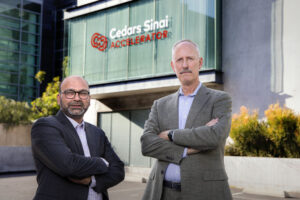Cedars-Sinai Launches Venture Fund in the Netherlands
The American healthcare organization’s Dutch initiative will build global partnerships, accelerate clinical translation and help bring health tech innovations to patients faster

Image credits: Cedars-Sinai | Nirdesh Gupta (left) and James Laur
California-based Cedars-Sinai Technology Ventures, part of the Cedars-Sinai healthcare organization, has launched Coronet Ventures Netherlands to invest in innovative startups in the Dutch life sciences & health ecosystem. The new fund is Cedars-Sinai’s third international venture initiative, deepening the organization’s commitment to investing in novel healthcare technologies worldwide to enhance patient care. Cedars-Sinai leaders made the announcement at healthcare innovation conference HLTH Europe 2025 in Amsterdam.
“At Cedars-Sinai, we are dedicated to advancing innovations that improve patient care while making healthcare more efficient and cost effective. With Coronet Netherlands, we are building new global partnerships to access leading science, accelerate clinical translation and help bring breakthrough technologies to patients faster,” said James D. Laur, JD, chief executive of Intellectual Property and Health Ventures at Cedars-Sinai, and co-founder of the Cedars-Sinai Accelerator.
Accelerating health innovation for real-world impact
Coronet Ventures Netherlands is poised to make an impact on the Dutch ecosystem for startups and research & development in the field of health innovation. It will focus on early-stage health technology and biomedical startups working on innovations targeted for the U.S. market, investing $50 million over the next decade.
Through its relationship with Cedars-Sinai, the fund will connect startups with vast clinical data to test and verify new technology, launch pilot programs and test products. In turn, Cedars-Sinai will benefit from the innovations developed by the Dutch startups it supports.
“This partnership allows us to create a platform with underlying capital that also offers deep clinical validation and commercialization support to help healthcare and biotechnology companies scale more quickly into the U.S.,” said Nirdesh K. Gupta, PhD, managing partner of Cedars-Sinai Intellectual Property Company.
These operations fit into the larger goals of Cedars-Sinai Technology Ventures, which accelerates the translation of research and early-stage innovations into real-world healthcare solutions by connecting scientists, entrepreneurs and investors with the U.S. market. Ultimately, this approach drives advancements that can benefit patients at Cedars-Sinai and around the world. Building partnerships is key to its mission, which makes it an ideal match for the Dutch quadruple helix model of life sciences & health collaboration.
A successful model of U.S.-Dutch collaboration
The new venture fund builds on four years of collaboration between Cedars-Sinai Technology Ventures and Dutch innovators. Since 2021, Cedars-Sinai Technology Ventures has met with startups from the Netherlands to explore opportunities with the Cedars-Sinai Accelerator – a Technology Ventures subsidiary that supports early-stage companies with mentorship and a $100,000 investment.
Two Dutch startups have already participated in the accelerator program: HealthPlus.ai, which uses electronic health records and artificial intelligence to predict patients’ infection risk and assist with early medical intervention, and Syntho, which uses artificial intelligence to generate synthetic healthcare data used by medical researchers. Syntho has since completed a pilot program with Cedars-Sinai and is in discussions to collaborate with the organization’s Artificial Intelligence Lab.
About Cedars-Sinai Technology Ventures
Cedars-Sinai Technology Ventures protects and supports the commercialization of discoveries and technologies. Through its activities, Technology Ventures facilitates promising inventions to improve the quality of life for patients around the world. It actively seeks industry partners to develop these technologies and works to establish mutually beneficial long‑term relationships.
Source: Cedars-Sinai
23 June 2025